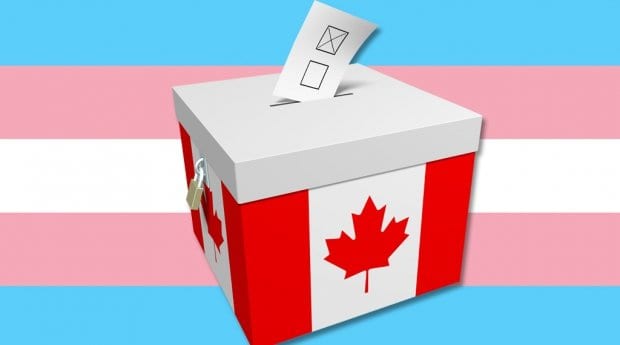A national coalition called Trans Vote Canada is operating a helpline to assist trans voters and to document any discrimination they may face at the polls.
“We want to make sure that trans people have a resource where the trans population explains to ourselves in our own terms what to expect and what to do if we run into problems,” says Morgane Oger, chair of Vancouver’s Trans Alliance Society, one of the organizations in the coalition.
The coalition consists of transgender activists, lawyers, organizations and members of the public.
“It’s to help people feel confident that they can do this really important act,” Oger explains. “There’s around 140,000 trans electors in Canada. This is a large number of people and it’s important to make sure we are heard.”
Oger says there are three common issues trans voters experience: receiving the wrong voter card; being outed at the polling station (if, for example, the voter doesn’t identify with the gender marker on their government-issued identification); and being misgendered.
Receiving the wrong voter card might deter people from voting because this close to the election, the mistake must be corrected in person at a polling station. Oger says she received an incorrect card and dealt with numerous people while filling out the required paperwork. She says she was then “congratulated” on her “new-found gender.”
Tori Phillips, a trans woman from Vancouver, says she received an incorrect voter’s card despite having paid income taxes under her name for the last three years.
When Phillips went to vote in the advanced polls, she says she had a positive experience fixing this mistake. She attributes this to her positive attitude and the open-minded nature of her neighbourhood, New Westminster. She says that trans voters may not have such a positive experience elsewhere.
“It’s been nice to hear that people can legally go and have their gender validated on their ballots, and vote without having identification that matches their gender,” says Dylan Hillyer, a genderfluid PhD student in Toronto. “But in my area, which is not a particularly dangerous one but that is a moderately conservative one, I just don’t trust that that’s going to be the case.
“Yeah, I’ll go out and vote but I’ll do it without disclosing that aspect about myself with anyone who doesn’t have to know,” Hillyer says.
Oger says one trans voter who received two voting cards was told by Elections Canada that they would continue to receive the additional incorrect card until a death certificate was provided “for the dead person whose name is no longer valid.”
In situations like these, someone from the helpline will be available to speak with an official at the polling station on behalf of the voter.
The coalition was contacted by Elections Canada about how to appropriately work with trans voters, which Oger says was an “unexpected good consequence.”
“Elections Canada wasn’t set up to receive name changes or gender changes,” Oger says. “They were only set up for heteronormative life changes like when a cis woman gets married and changes her name.”
According to Elections Canada, voters need two pieces of ID that have the same name. Voters are not required to show ID that indicates sex or gender.
However, the Elections Canada website states, “If you register or vote in person, a poll worker may ask you to explain why the photo does not match your appearance.”
In a press release, Trans Vote Canada says it “will assist voters in filing formal complaints with Elections Canada, the Commissioner of Elections or Canadian Human Rights Commission.”
Canada’s federal election takes place Oct 19, 2015.
The helpline can be reached at 1-888-978-5618.
Trans Vote Canada
votingwhiletrans.ca


 Why you can trust Xtra
Why you can trust Xtra


